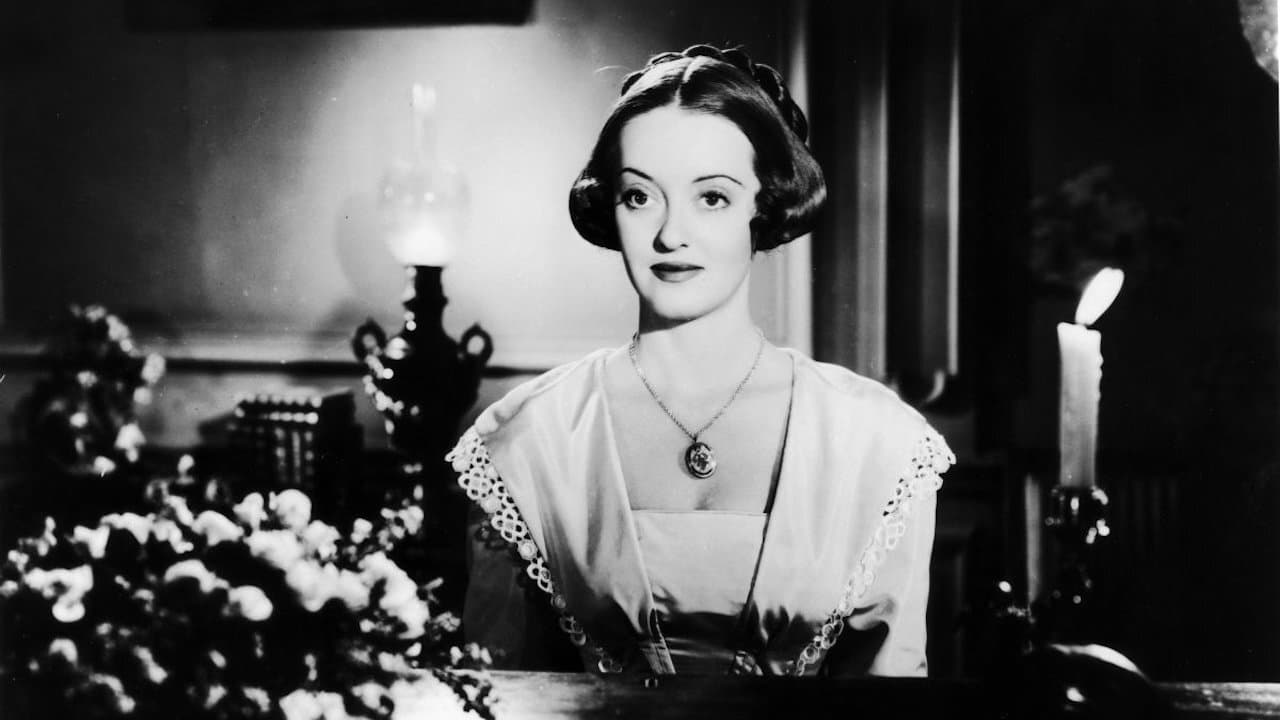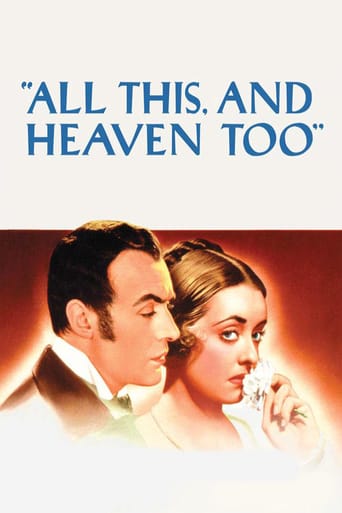

Too much about the plot just didn't add up, the writing was bad, some of the scenes were cringey and awkward,
... View MoreThe movie's neither hopeful in contrived ways, nor hopeless in different contrived ways. Somehow it manages to be wonderful
... View MoreTrue to its essence, the characters remain on the same line and manage to entertain the viewer, each highlighting their own distinctive qualities or touches.
... View MoreThe best films of this genre always show a path and provide a takeaway for being a better person.
... View MoreA really fine movie. Looks great, Fine script of a fascinating story. Boyer was never HOTTER!!!. Barbara O'Neill is brilliant and horrifying.. The story is fascinating and important. The one flaw and it is a big one is Davis. Against type? Maybe cast against type but she can't play against type. She always finds a way to be Bette Davis. The famous mannerisms were never greater minus a cigarette. The character must be vulnerable. DeHavilland? Her Sister? Maris Ouspenskya? Joan Crawford? (well, maybe not). It is not a simple character, she is strong but not a soubrette. There is little or no humor. Davis had a similar conflict in Now Voyager for which she was well suited. She must have been honored that MGM had chosen but she should have known better. Somehow the script can still evoke tears and fears. Try to ignore (though it isn't easy) the great flaw and you will have a great time.
... View MoreTwo years before Bette Davis refused to ask for the moon since she already had the stars, she thanked heaven for saving her from scandal's wrath in this riveting tear-jerker based upon a Rachel Crothers story of a wronged nanny and teacher who must defend herself from an unjustly notorious past from the giggling school girls who haven't a foggiest notion of the truth. Ms. Davis played many heroines in her day in addition to the scheming bitches, and padded her film work in 1940 with this classic as well as "The Letter" where she played an amoral murderess.In this film, her scandal involves supposed murder, and she is wrongly suspected of not only being an accomplice but the accused man's lover as well. She is working as nanny and teacher to the children of the unhappily married Charles Boyer and Barbara O'Neill, extremely wealthy European aristocrats whose marriage has turned into bitterness because of her jealous suspicions and obvious insanity. Rude instantly to Davis, she becomes more tyrannical as she realizes that her children have come to love Davis more than her and that Boyer has made her a confidante. In one horrific scene, O'Neill takes her ailing son out on a carriage ride to try and establish her authority which further threatens the boy's health. Young Richard Nichols is sweet in the part, ironic considering that the same year, he would play Hoan Crawford's ward in "A Woman's Face".Davis is at her most noble here, suffering gallantly in period costumes and deserving a four handkerchief salute for her sincere performance. Boyer is a combination of imperiousness and compassion, turning in a most praise-worthy performance. A year after playing Scarlett O'Hara's mother in "Gone With the Wind", Ms. O'Neill took motherhood to a whole different dimension, reminding us that she had also played the gracious society matron who agreed to take in Anne Shirley in "Stella Dallas". But there's not a one dimensionalism in her character. In spite of her dislikability, you really understand why she is the way she is.Outstanding production design and great character performances also highlight this "Triple A" Warner Brothers production which was beautifully directed by Anatole Litvak and features a magnificent musical score by Max Steiner and beautiful photography by Ernest Haller. For some reason, this Best Picture nominee isn't as well known as many of Davis's classics from this era, and deserves to move up in status to being one of the all-time greats.
... View MoreBette Davis stars as Henriette, a governess who comes to work in the Paris home of the Duc de Praslin (Charles Boyer), in 1847. The Duc's jealous wife has always made his life difficult and the presence of the pretty, young governess brings their marriage to the boiling point. The Duc's children soon adore Henriette and he grows close to her, too, but does he feel gratitude for a job well done or is he falling in love with her? This romance/murder was based on a true story which was instrumental in bringing about the French Revolution of 1848. The movie is generally entertaining but falls short in several areas. First, the cast all overact so much that it quickly becomes soap-opera/melodrama. The costumes and interior sets are elegant, but the exteriors are cheap fakes. The movie is 30 minutes too long and consists mostly of exaggerated, grand speeches that aren't at all realistic. Davis sounds like Davis, which is to say, not French in the least. None of the others (except Boyer, of course) attempt a French accent, either, and the youngest child sounds Southern when he calls Davis, "Mahdum-mo-zayull." Homespun character actor Henry Davenport is also miscast as a Frenchman. Handsome Boyer gets a lot of close-ups but one can't tell if he's trying to be suave and loving or suave and sinister.Typical of the women's movies of the day, there are lots of tears and swelling violins and noble self-sacrificing, but it's just an okay movie for me.
... View MoreThis was a long one, but it wasn't all for nothing. I thought that the acting was spot on, except for the children. Their acting sort of made it seem like a musical. The interactions between Betty and the children were definitely dramatized but it was to emphasize the fact that they came from a broken home and she would do anything for them. The antagonist was the wife and what an antagonist she was. I absolutely hated her by the end of the film and I wasn't the least bit sad when she died. The protagonist was Betty and she did a great job playing a tame, respectful, and well-mannered governess. The design of the movie contributed significantly to the verisimilitude along with the acting. The house and the dress was magnificent. I don't think that the camera-work was anything spectacular, and I feel the same way about the lighting. However, there is one scene that stands out and that is right before the husband kills the wife and you see him from her point of view. He looks absolutely mad and he is coming right at the camera. That was pretty cool. Other than that, the film was meant to seem ordinary in order to seem believable. All in all, it was a wonderful story and definitely called for tears.
... View More